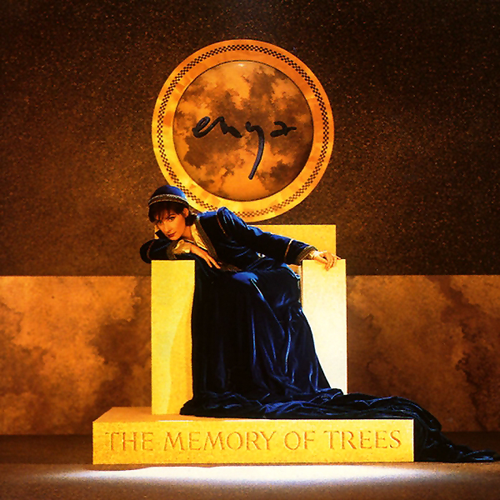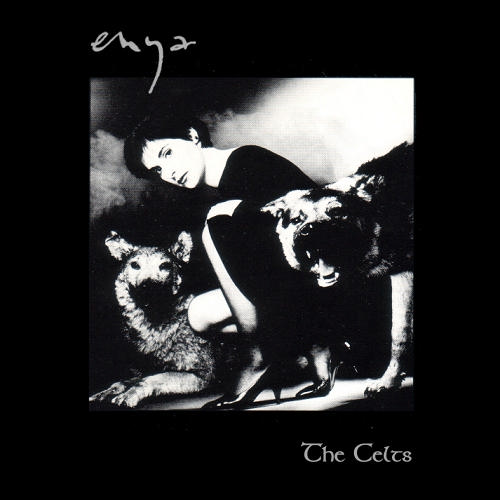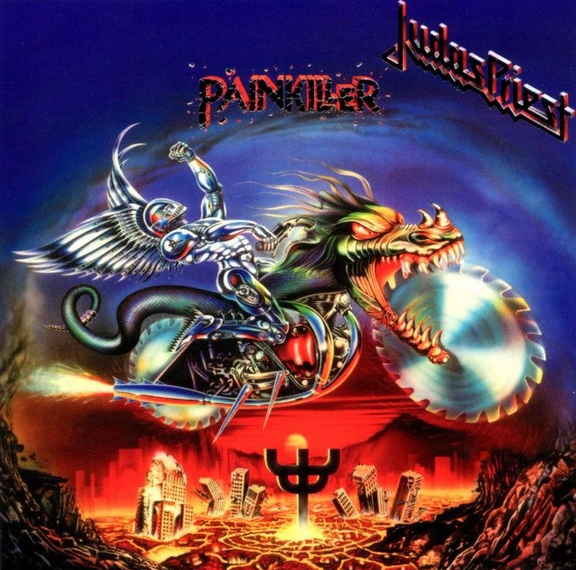 Enya’s fourth album finds her wealthy, successful, and comfortable. The music has started to suffer. The Memory of Trees is lavish…but it’s self-indulgent in places, and wants for the smallness and humbleness Enya had on her early releases.
Enya’s fourth album finds her wealthy, successful, and comfortable. The music has started to suffer. The Memory of Trees is lavish…but it’s self-indulgent in places, and wants for the smallness and humbleness Enya had on her early releases.
After the pleasant title track, we get “Anywhere Is”, which is catchy and enticing, but as unsatisfying as a cake that’s all icing. Enya’s voice utterly dominates the track. Enya used to sing over music, but now her singing is the music, with the instrumentation being some light percussion and orchestral stabs. The song sounds too samey. Where “I Want Tomorrow” and “Exile” took you on a journey, “Anywhere Is” takes you around in circles. Skip 10 seconds in or 30 seconds in or 1 minute in or 3 minutes in…same thing.
“Pax Deorum” is well-meant attempt at being creepy. It works about as well as “creepy” always does for Enya…not super well.
At “Athair Ar Neamh” the album finally gets out of cruise control mode. I really like this song. Enya sounds vulnerable and fragile, and Nicky Ryan’s production compliments the atmosphere. There’s still a “vocals > all” approach here but it works better than on other tracks. “From Where I Am” is a piano song that reminds a bit of the title track on Watermark.
From there the album goes back and forth between well-deserved classics and songs that sound pleasant and are easily forgotten. “Once You Had Gold” sounds great. “On My Way Home” comes from the same die as “Anywhere Is” but sounds a bit more varied and elaborate. “Tea House Moon” tickles the ears a bit with some strange melodies but doesn’t really stick with you. Another weird thing about modern Enya is that she doesn’t seem to be that great at writing instrumentals any more.
There’s not a lot of musical residue left over from The Celts. What a pity.
No more badass Vangelis-sounding tracks that mix classical music with futuristic synths. This is the album of piano, pad choirs, and Enya’s voice. No more songs like “Epona”, with wandering, lonely melodies that seem almost afraid to let you hear them. Enya now hews to a pop songwriting model worthy of Kara Dioguardi and Max Martin. This is the last Enya album I own a copy of, but I’ve listened to the later ones and they all seem to be like The Memory of Trees, but a bit worse. I wish Enya hadn’t decided that musical evolution means not adding things to her sound, but cutting things out of it.
 Enya’s first album is different from the others, as her signature sound had not yet been hammered out. But it’s better than the others…maybe because her signature sound had not yet been hammered out.
Enya’s first album is different from the others, as her signature sound had not yet been hammered out. But it’s better than the others…maybe because her signature sound had not yet been hammered out.
Where later Enya releases just kind of bulldoze you under a massive wall of pad synths and layered vocal tracks (they’re still good), The Celts sounds sparse and intriguing. It has more active instrumentation than any of her other releases. The melodies are more discernable. The textures are stronger and richer, and it seems to draw on a wider set of influences. You hear some things Enya seems afraid to touch these days: such as lead synths and electric guitar.
“The Celts” and “Aldebaran” are both very nice, and then “I Want Tomorrow” arrives…yeah, this song is just insane. Most Enya songs tend to ride a single big idea around like a pony, whether it’s a chorus hook or a melody or whatever. “I Want Tomorrow” does have some climactic parts but it mostly comes across as a free-flowing experience that isn’t written around any particular moment in the track. It’s hard to explain, but the song sounds like a couple of different songs joined together, all of them articulating different moods, but all of them making sense with each other.
About two thirds of the The Celts has no lyrics. I’d call these songs instrumental, except Enya’s “instrument” of choice has always been her layered backing vocals, of which there are a plenitude.
A few highlights emerge from these wordless songs. “Epona” is compact and efficient, and reminds of Vangelis classics such as “Movement V.” The three sections of “Triad” take the listener through a series of differing moods and atmospheres. “The Sun in the Stream” is the second amazing classic from the album. It’s brilliantly realised from start to finish…just a perfect song.
This is the Enya CD I always come back to. Watermark and Shepherd Moon aren’t too far behind musically, but on The Celts Enya found something very rare and special…and then lost it again. I don’t expect her to ever produce a work of this quality again.
 The only word that describes Painkiller is “mighty”. It serves as the last word on 80s metal, an amazing elegy of speed and power.
The only word that describes Painkiller is “mighty”. It serves as the last word on 80s metal, an amazing elegy of speed and power.
A lineup change has taken place from the last album. Dave Holland was good at simple AC/DC 4/4 beats, also good if you’re a social worker who enjoys dealing with molested children and wants there to be a profusion of them, but he was, frankly, an alarmingly boring drummer. In his place is Racer-X skinsman Scott Travis. He preserves the punchiness always associated with Priest’s drumming, but gearshifts the intensity way, way up. The one man artillery assault opening “Painkiller”, the fast double bass of “Leather Rebel”, the stadium-filling snare hits of “Touch of Evil”, and numerous other moments reveal that he is good news for the band.
Painkiller is full of songs that listen well on their own, but the correct way to listen to it is in one go, so that the energy builds and transfers from one track to the next. “Painkiller” is a well-known classic featuring amazing vocals and guitar work, “Hell Patrol” is a bit more restrained, and “All Guns Blazing” and “Metal Meltdown” are vicious and thrashing. “Leather Rebel” sports a signature speed-picked pentatonic riff that’s been copied by everyone from Gamma Ray to Bobby Price (“Donna to the Rescue” – Doom OST).
After track 5 the album officially goes from “great” to “epochal”. “Nightcrawler” is “The Sentinel” with a weaponry upgrade – an impressive mixture of heaviness and atmosphere. “Between the Hammer & the Anvil” features my all-time favourite Judas Priest riff and another incredible vocal job from Rob Halford. But the album’s best moment is “A Touch of Evil,” which slows the tempo to a crawl while Tipton and Downing bludgeon a signature 80s guitar riff through your skull. The instrumentation, the vocals, the songwriting, and Chris Tsangarides’ scorching production all come together in a paroxysm of classic Judas Priest greatness.
There’s a bonus track on some version of Painkiller called “Living Bad Dreams” which is an all-out power ballad. It’s good, but not great. There’s a “live” version of “Leather Rebel” (I have a feeling they punched it up a bit in the studio).
This would be the last Halford-fronted Priest album for fifteen years. It seems Painkiller succeeded in burning Halford out. He would go on to explore musical projects more “alternative” (Fight, Two) and his earstwhile bandmates steered Judas Priest’s style away from Painkiller’s ultra-fetishised 80s metal. Even now, Judas Priest has never fully revisited Painkiller territory. Maybe that’s the final proof of the album’s power…it scared off the men who wrote it.
 Enya’s fourth album finds her wealthy, successful, and comfortable. The music has started to suffer. The Memory of Trees is lavish…but it’s self-indulgent in places, and wants for the smallness and humbleness Enya had on her early releases.
Enya’s fourth album finds her wealthy, successful, and comfortable. The music has started to suffer. The Memory of Trees is lavish…but it’s self-indulgent in places, and wants for the smallness and humbleness Enya had on her early releases.

